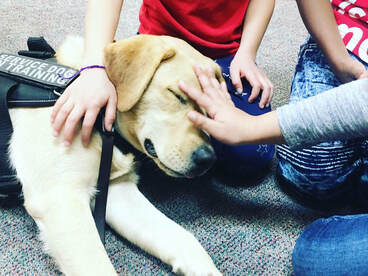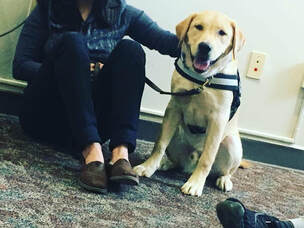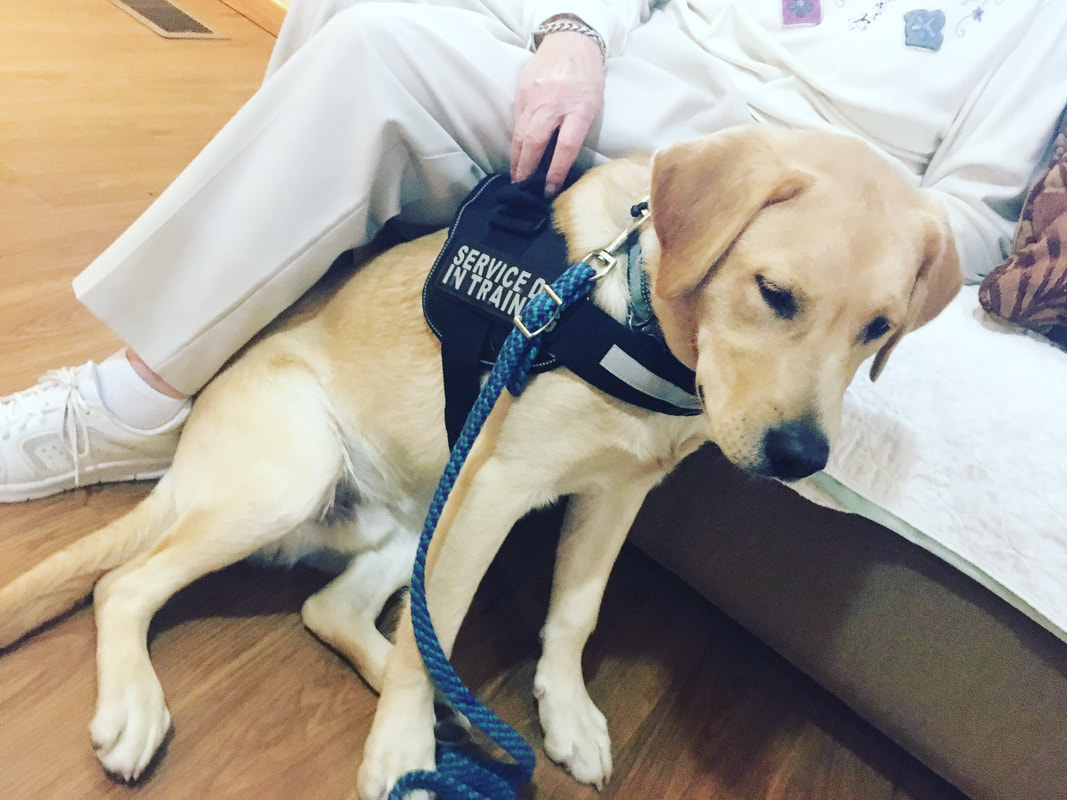 Become a Therapy Dog Handler and Make a Difference! Therapy dogs bring smiles, brighten the room, and offer a reprieve from endless grief. Dogs can sit quietly, absorbing and washing away a person’s sadness. They don’t mind if their beautiful coat becomes soaked with tears, and they don’t ask anything in return. Therapy dogs visit rest homes, schools, group homes, children’s homes, hospitals, and rehabilitation homes. They can be part of a special emergency response team, such as TIP (Trauma Intervention Program), and work on-call to provide support to those facing “the worst day of their life”. As a volunteer, you and your dog can work independently or with an organization. If you plan on visiting multiple facilities or desire to volunteer with a larger organization, you will most likely be required to be certified as a “therapy dog team.” As an independent volunteer visiting one facility regularly, you may find that you do not need to be certified as a “therapy dog team.” Each facility has its own policy for visiting therapy animals. Call and ask what their requirements are. They may require no certification, or they may require you be certified by a specific organization, such as Alliance of Therapy Dogs. They may also require a background check or flu vaccine. Often, if you are visiting a family member daily in a rest home, they may only require the pet’s vaccine records. Whether you visit one facility or many, achieve certification with one organization or the other, or become certified at all, you MUST have a dog with the right personality and skills to do the job safely and effectively. NOT ALL DOGS WANT TO BE THERAPY DOGS! Does your dog enjoy being next to you and petted? Does he or she nudge or elicit petting from strangers? Or does she duck away when being reached for? NOT ALL DOGS HAVE THE SKILLS TO BE THERAPY DOGS Is your dog extremely well socialized? Not fearful of men, women, children, hats, gloves, medical equipment, dogs, cats? Is he or she calm and relaxed, or hyper and jumping on guests? Has your dog ever growled, snapped at, nipped, or bitten another person or dog? REQUIREMENTS FOR A THERAPY DOG 1. Desire to be petted and interact calmly with people. 2. Calm personality, not overly excitable or hyper. 3. Well trained in obedience skills heel, sit, down, and stay. 4. Socialized with dogs, cats, children, men, women, seniors, slippery floors, loud noises, sirens, stairs, elevators, wheelchairs, walkers, people with unsteady gaits, noisy medical equipment, loud speakers, and more. 5. Goes to the bathroom outside before and after each therapy visit. Never soils during a therapy visit. 6. Never a history (during a therapy visit or at any time) of growling, snapping, nipping, or biting a person or another animal. Any aggression or history of aggression disqualifies the animal. NEXT STEP …. CERTIFICATION!!!  Do you need a PTSD Service Dog or Protection Dog? A person suffering from PTSD or severe anxiety faces challenges in every day situations, making life’s necessary tasks difficult to complete. Some sufferers believe a service dog would provide them with security, helping to alleviate the symptoms of PTSD, allowing for more freedom through a sense of security. PTSD is triggered in the patient by a terrifying event occurring to them or the witnessing of such an event. The symptoms that may be experienced are intrusive memories, avoiding places, people or activities, negative changes in mood, and changes in physical and emotional reactions. It is of natural course for the individual to want a service dog that would protect them from any future threat. Having a well trained dog at your side 24/7 may have a positive effect on your mood, increase your willingness to go places or engage in activities, and give you focus of something very positive that needs daily care and love. Service dogs for PTSD are trained in tasks to interrupt intrusive memories, provide the confidence to go out in public, and be a catalyst for a positive mood and provide the structure for emotional awareness. Dogs have incredible healing powers, known to those who love them. Protection dogs are trained to bark, attack and/or bite a person that is threanting their handler. Properly trained protection dogs are an excellent deterrent for would-be criminals and make their handlers feel safe in any situation of threat. Legalities and responsibilities of a protection dog are different from that of a service dog. Protection dogs are trained to attack to protect their handler. These types of dogs are NOT service dogs. Since they are not service dogs, protection dogs are not granted public access with their handlers. Dogs trained to attack are a very real danger to the general public, places that a service dog must navigate daily. While a protection dog may make a sufferer of PTSD feel very safe and confident, the drawback is that the dog cannot accompany them to the places that often cause the most significant symptoms, such as flying, shopping, working, and doing group activities. A protection dog stunts the healing process of PTSD because they can keep people away as opposed to encouraging positive interactions with friends, increase the handler’s anxiety through hyper vigilance, promote isolation because they cannot go into public places, and cause their handler to become more isolated because no one wants to hang around a dangerous or scary dog. The laws governing service dogs are not all encompassing, but it is made clear that service dogs are never to be aggressive or trained to be aggressive in any manner. Service dogs are held to a higher standard than pets because they can go into grocery stores, theaters, schools, places of work, and any place the general public uses. The public has a right to enjoy these places safely and not be exposed to or be threatened by aggressive dogs. Service dog handlers are legally responsible for their dogs’ behavior! If you suffer from PTSD or severe anxiety and want a service dog to help in your healing journey, it must be trained to perform specific tasks to interrupt intrusive memories, provide the confidence to go out in public, and be of a sound temperament to function as a catalyst for a positive mood and provide the structure for increased emotional awareness. A PTSD service dog performs tasks like turning on a light upon awaking from a nightmare, standing behind you for a sense of security, circling around you on command to help keep space between you and other shoppers, and provide deep pressure therapy during overwhelming emotional episodes. Bottom line is, if you want a protection dog, buy a protection dog. If you want healing, seek a properly trained service dog for PTSD. One is not the other and roles cannot be interchanged. We wish you health and comfort on your PTSD healing journey. May you be blessed with the unconditional love of man’s best friend, the dog. Appalachian Dog Training LLC provides fully trained service dogs for PTSD. Download or request an application today to learn more about PTSD service dogs and how they can make a difference in your life! |
AuthorKatie Weibel, Master Dog Trainer. Providing training for companion, service and working dogs, sharing knowledge and expertise. Archives
April 2023
Categories |
Address (by appointment):
|
Phone/Text |
|

